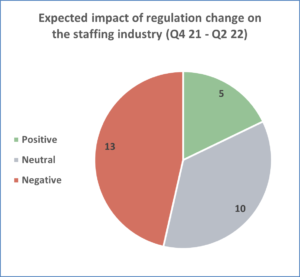Published on 25th November 2021
WEC’s Staffing Executive Regulatory Outlook (SERO) presents the results from a quarterly poll of top executives of National Staffing Federations around the world, asking them to assess the likelihood and potential impact of regulatory changes on the staffing industry within the next six-month period.
Executives of 28 different National Staffing Federations have responded to this first edition.

The overall regulatory outlook in the period between Q4 2021 and Q2 2022 is negative in 13 countries from an industry perspective. In 10 countries, the impact of regulation changes is expected to be neutral overall, while in 5 countries, the overall outlook is positive.
In Chile, Norway, Russia and Sweden, the impact of regulation changes on the staffing sector is expected to be the most negative, according to the SERO poll.
In Italy and Spain, the staffing industry anticipates regulation changes, which will have an overall strong and positive impact on the sector.
Changes to labour conditions for agency workers will have an expected negative impact on staffing in 7 countries, while changes to regulation on the conditions for the use of agency work services are expected to negatively impact staffing in 6 countries. On the other hand, in 5 countries a positive impact is anticipated from regulatory changes to conditions for use.
WEC members can access a more detailed analysis of the SERO results on the Members’ Area.